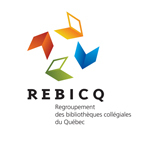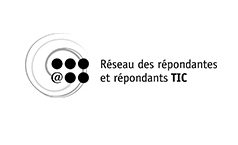REBICQ Workshop Report: Sharing Practices for Library Research Training
Additional contributors for this article : Philippe Lavigueur, Specialist in Training Methods and Techniques (STMT/SMTE) Montmorency, Josiane Sauvé, STMT/SMTE Lionel-Groulx, Julie Larocque, STMT/SMTE Saint-Laurent, Andrée Dagenais, Professional Librarian, Centre de documentation collégiale, Daniel Marquis, Education Advisor and Professional Librarian, Bibliothèque et technologies éducatives, Granby.
On Wednesday, December 10th, 2014, Profweb attended a videoconference entitled Library Research Training Practices (Les pratiques en matière de formation documentaire) which was organized by the Regroupement des bibliothèques collégiales du Québec (REBICQ) and the IT Representatives Network (Réseau des répondantes et répondants TIC – REPTIC).


The goal of the activity was to present the results of a survey of REBICQ members that was conducted in the spring of 2014. The survey was organized in order to better understand the library research training practices of each of the members. The results were presented by Philippe Lavigueur, a Specialist in Training Methods and Techniques (STMT/SMTE) from Cégep Montmorency, who is also the leader of the library research training committee.
Forty-three of the 53 establishments responded to the survey including four English CEGEPs. The results therefore provide a representative portrait of the current offering of training provided by libraries to the students within the college network. Even though this first survey on library research training didn’t cover the qualitative aspects of the training, a large number of elements resonated with the members of the IT Representatives Network (REPTICs) who attended the videoconference.
Some findings about the training offered, its content and its evaluation
All of the establishments that responded to the survey are offering library research training which can take on various forms: workshops in a computer lab, library tours, video capsules, tutorials or in-class workshops.
- The library research training is applicable to a large number of courses and programmes. It’s not exclusive to Social Science – contrary to popular belief.
- Library professionals recognize the importance of promoting the development of informational competencies among college students and most of these professionals contribute to the delivery of workshops or the creation of resources.
- More than half of the respondents (58%) confirm that they have a space dedicated to library research training within the library or in an adjacent room.
The most frequently visited aspects of the library research workshops, as identified by survey respondents (in order of importance):
- Choosing research tools
- Exploring the library’s web site
- Identifying relevant keywords for a search
- Evaluating the validity of sources of information (credibility, objectivity, reliability of the source)
- An overview of research tool functionality
- The differences among various types of documents
- Plagiarism
The survey also revealed the documentary resources that are the most widely covered within the training: library catalogue (100%), Repère (91%), Eureka (91%), Érudit (84%), Universalis (70%). However, many participants stated that their college is not subscribed to a number of the resources found in this list. If there is a common denominator among the different establishments, it is difficult to determine since the resources can vary from one year to another within the very same college. The selection also clearly differs according to the language of instruction at the college.
The average duration for a training session is between 31 and 60 minutes. Time constraints appear to be the most significant hurdle for students to achieve the desired level of competency for library research and informational skills. The survey participants highlighted the importance of putting a process in place to reinforce the learning in partnership with the teachers. One way to achieve this would be to meet the same groups of students again to continue the training.
- 81% of the respondents put an evaluation procedure in place (summative or formative) allowing to verify whether the students understood the library research training. Is this sufficient to properly understand the material over the long term?
- 26% of the respondents put measures in place to evaluate the training itself. Without a clearer picture, it’s difficult for the committee to encourage best practices or to suggest pedagogical and technical improvements to the existing practices.
Who organizes the training?
The Librarians are essentially responsible for organizing the training workshops, with a significant contribution from the Documentation Technicians. The decision to offer a library research training workshop is the direct result of an agreement with teachers.
Furthermore, the survey respondents believe that there is a heightened synergy between the library professionals and the departmental decision-makers. This allows them to reach the greatest possible number of students by making the training more systematic. The fact that a Librarian’s role is not well understood sometimes results in their expertise not being exploited in program discussions during departmental meetings. For this reason, removing the barriers between the various professions represents an interesting challenge, one that has not fully been addressed within the colleges. Many survey participants noted this on-going issue during the discussion period of the videoconference.
For the survey respondents, there are still many avenues to explore to increase the cooperation with the Teachers. The Librarians would like to call on them more often in the process of informational literacy training, on the one hand to promote further assimilation of the content by the students, and on the other hand to promote greater autonomy for the stakeholders. The Librarians could transform their practice in this way and assume the role of guide for the students in partnership with the IT- Representatives.
The ICT Profile and new technologies
The respondents were asked whether their establishment had integrated the ICT Profile within the student’s training:
- 37% confirmed that the profile had been implemented within their establishment
- 16% were unsure if the profile was present within their establishment
According to the survey results, the colleges that integrated the ICT profile into all of their programs reached out to a larger number of students than those that had not integrated the ICT profile at all.
The equipment used most often in the workshops were as follows:
- Computers (100%)
- Projectors (86%)
- Interactive whiteboards (37%)
Other equipment that was used included clickers, cell phones, and tablets. Distance education solutions are also gradually being integrated into the training.
Despite the relevance of bibliographic reference management software such as Endnote or Zotero within the framework of learning informational literacy skills, these were not very present in the current training offered by survey respondents. Only 4 of the 43 respondents indicated that this software was covered in the workshops at their colleges.
In the end, the survey respondents felt that time constraints are the main obstacle to including more technology training in the workshops for the students.
A useful and necessary dialogue between stakeholders
The REBICQ investigation responded to a need to better understand the practices put in place by the various member establishments. It revealed a need to pursue the dialogue between the various stakeholders – the Teachers and IT-REPs among others – who are called upon to support the student’s learning with regards to informational literacy skills. The videoconference generated further discussion and a call for greater cooperation between these stakeholders which will allow for better support for students in the process of learning. It will require a collective effort to reinforce the integration of library research training and the ICT Profile for students within the colleges.

